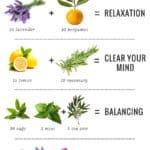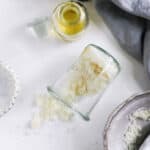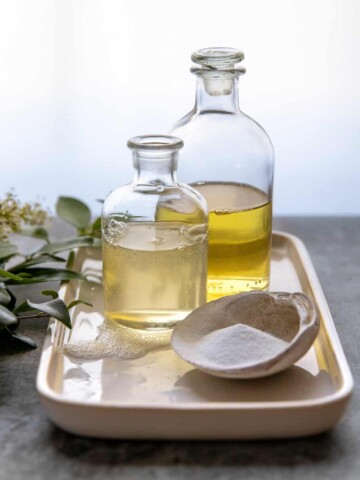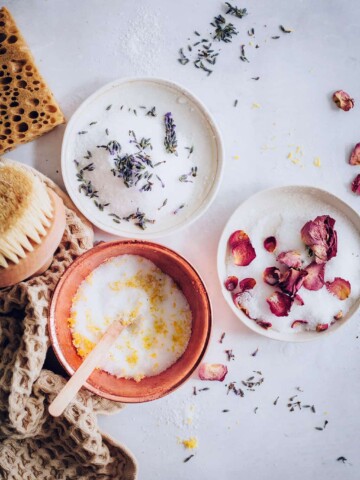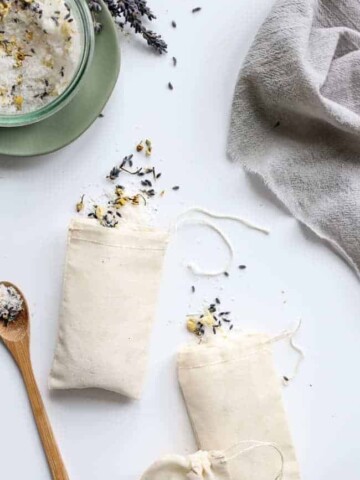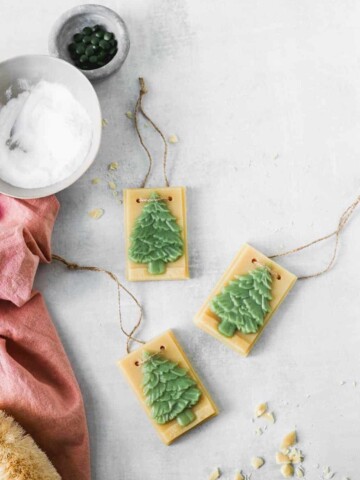Creating your own essential oil bath salts is a fabulous way to bring a bit of luxury to your bath time routine. Customize these simple, inexpensive DIY bath salts for all sorts of ailments from cold and flu to achy, sore muscles, and everything in between. Use our relaxing bath salt recipe to get you started.
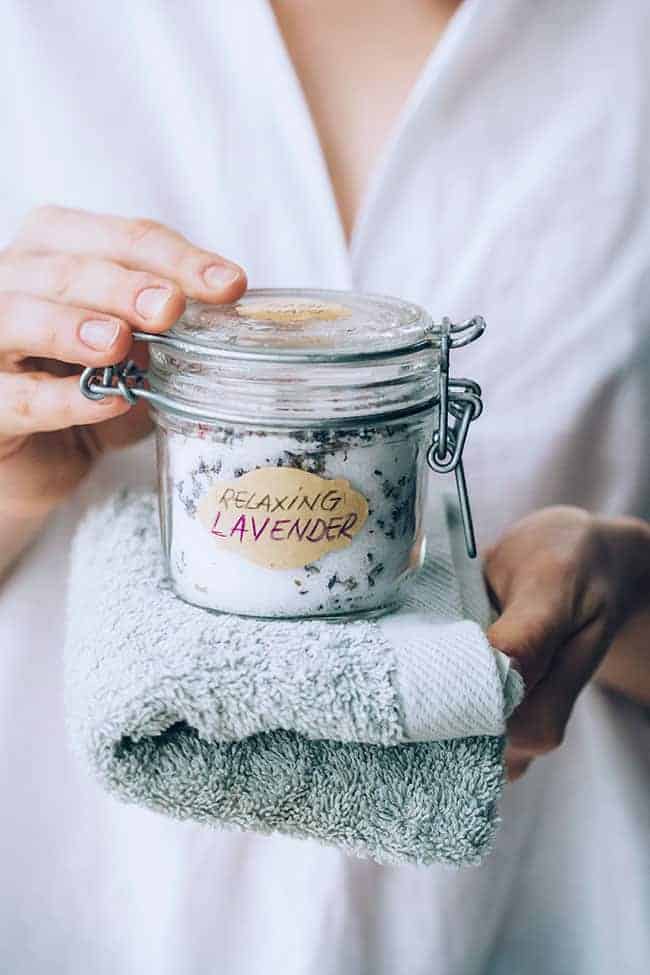
How To Make Bath Salts with Essential Oils
I often underestimate the power of a bath. Whenever I wasn't feeling well as a kid, the answer was always to have a warm bath. And I did, in fact, feel much better afterward.
Today, I tend to forget that feeling until I finally settle into the warm water, and the reassuring memories return. The term "aromatherapy bath salts" refers to the use of essential oils and natural ingredients to relax, soothe, and cleanse—and let me tell you, they work wonders.
Jump to:
- How To Make Bath Salts with Essential Oils
- Ingredients
- Instructions
- Ways To Customize DIY Bath Salts
- 1. Change the Salt Base
- 2. Experiment with Essential Oils
- 3. Add Natural Additives
- 4. Include Skin-Nourishing Oils
- 5. Play with Colors
- 6. Incorporate Exfoliants
- 7. Enhance the Experience
- Bath Salt Benefits: 8 Essential Oil + Salt Blends
- Bath Salt Recipe Variations
- Tips for Storing Bath Salts
- Tips for Using Homemade Bath Salts
- FAQ
- References
Ingredients
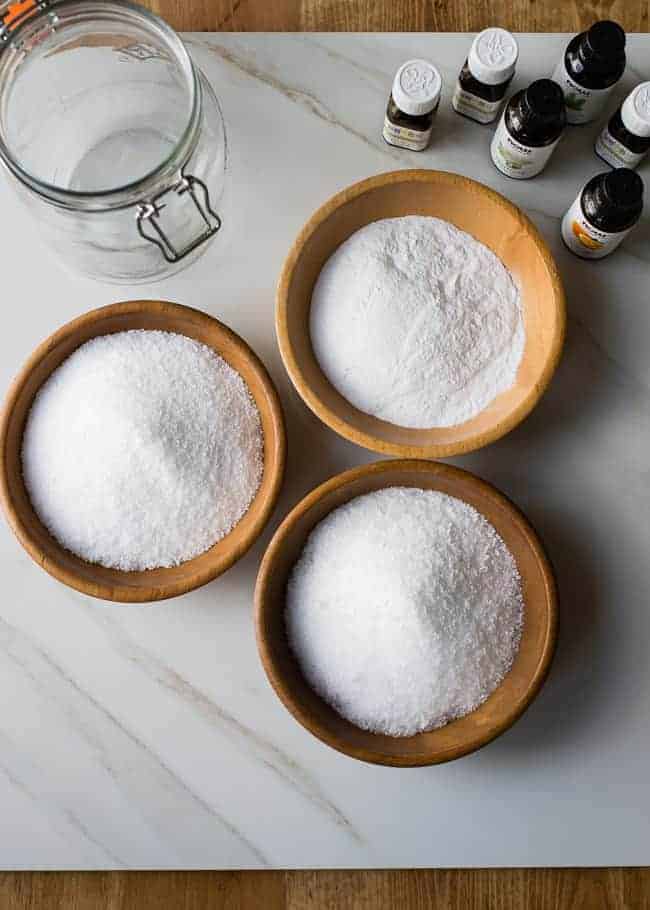
This all-purpose bath salt is made with 2 parts Epsom salt, 2 parts kosher salt, and 1 part baking soda. The salts contain minerals that are absorbed through the skin to help ease muscle soreness and relieve tension, while the baking soda soothes the skin surface.
1. Kosher Salt
Kosher salt is my bath salt of choice because it contains a plethora of vitamins and minerals that are great for skin. Plus, it has a very fine grain, so it dissolves quickly under running water. But feel free to use any natural salt you like.
2. Epsom Salt
This not-really-a-salt salt is a great source of magnesium, a mineral that has many benefits. Magnesium helps your body produce energy, and when you're deficient, you might feel more anxious, experience more painful PMS symptoms, and have muscle aches [source].
An Epsom salt soak is a simple way to boost magnesium levels because it can be absorbed into the skin while you bathe. Just make sure you do not use magnesium internally because it can be toxic [source].
3. Baking soda
Baking soda helps prevent the bath from being too irritating to the skin. As soon as you add baking soda to water, you can feel the difference—the water feels a little silkier, without being outright slippery on your skin. Taking a baking soda bath can reduce skin irritation, scaly skin, and itching, too [source].
4. Essential oils
Ready to add essential oils to your bath? Infusing bath salts with essential oils adds aromatherapy benefits. And, depending on the blend you decide to use, they can help with relaxation [source], better sleep, clearing the mind, rejuvenation, and even relief for stuffy noses.
A general rule of thumb is to use about 5-10 drops of essential oil per tablespoon of carrier oil. This ensures the essential oils are properly diluted, making them safe for your skin and helping to distribute them evenly in the salts.
Instructions
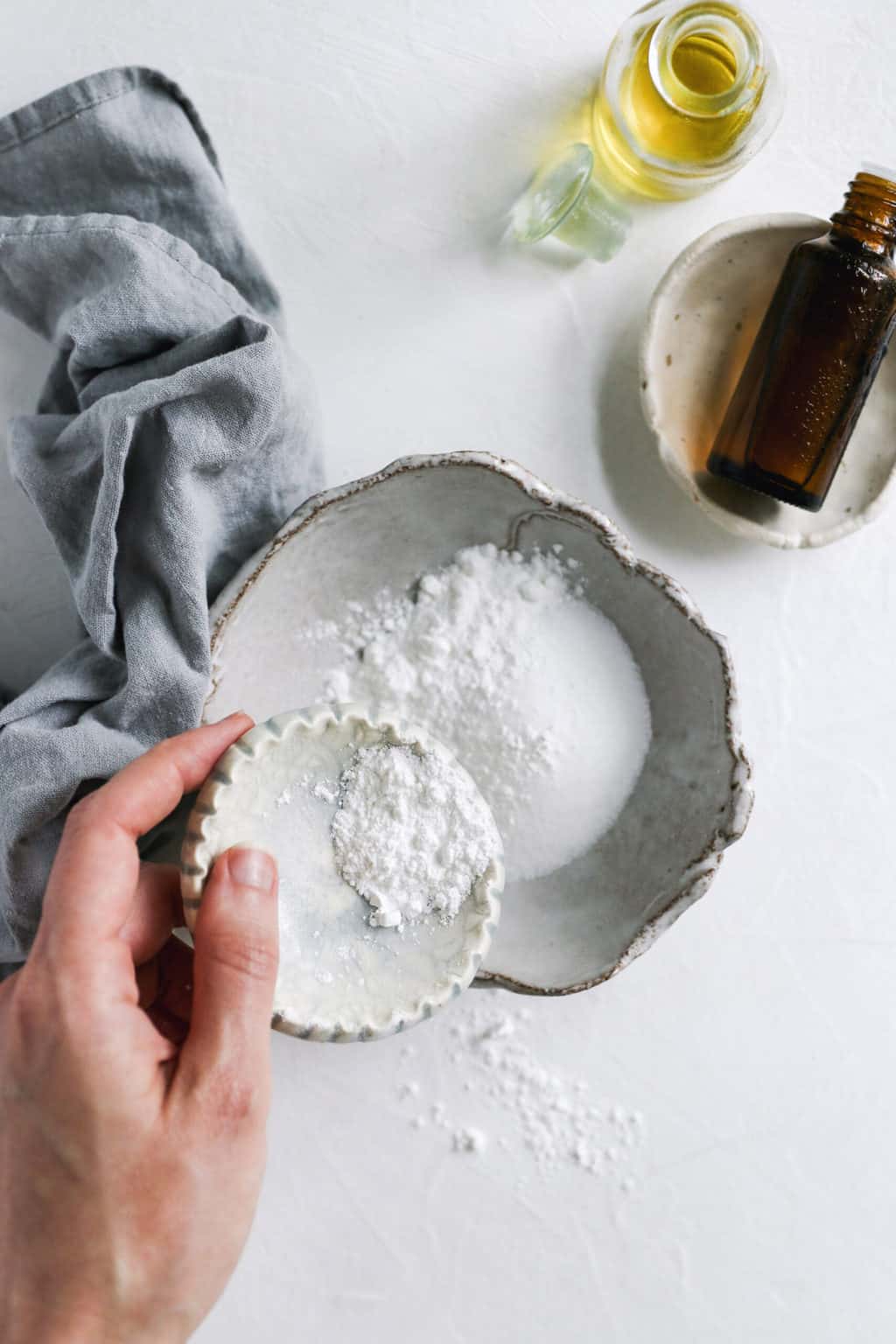
Step 1: Mix salts
Combine salts and baking soda in a small bowl.
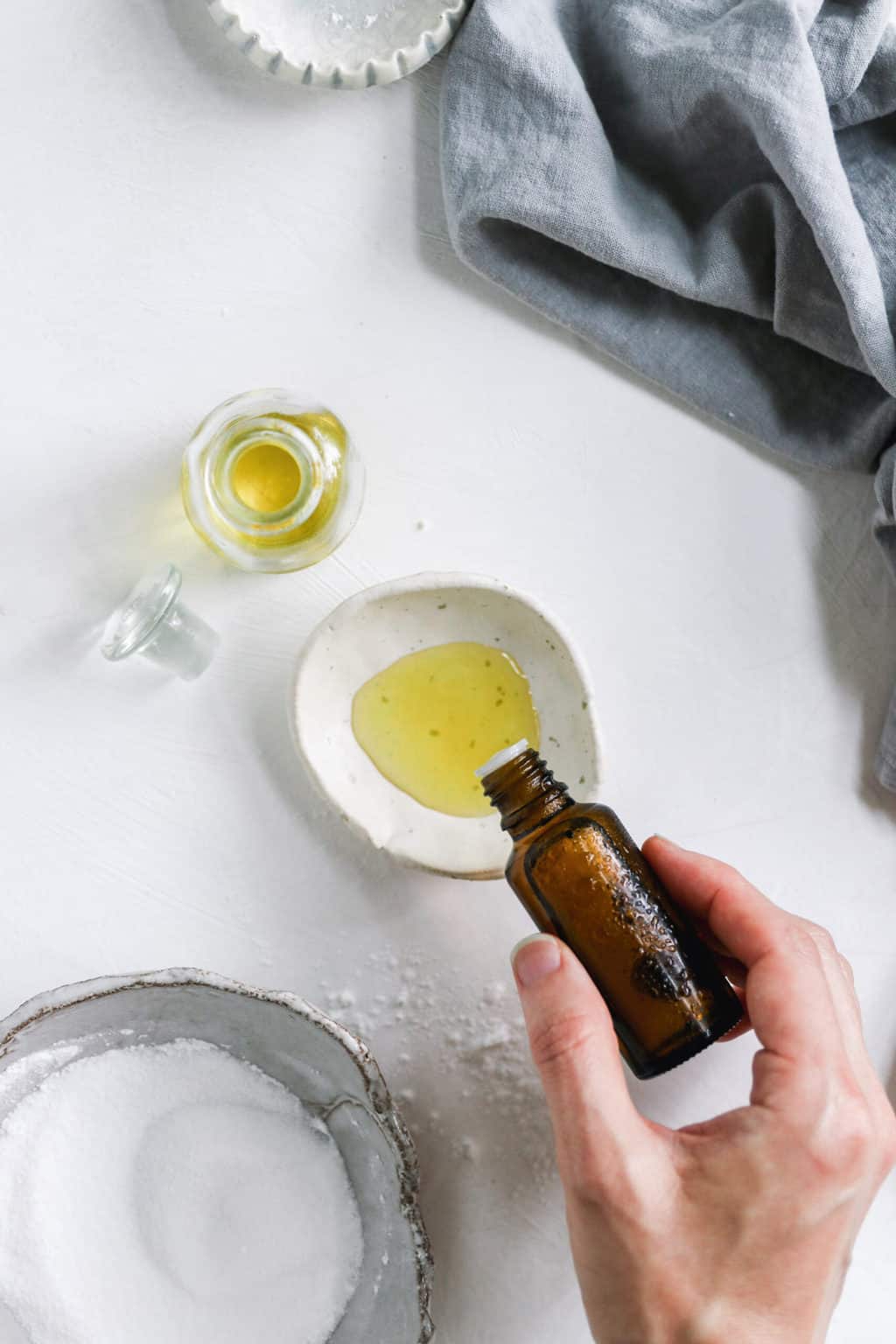
Step 2: Combine oils
Separately, combine the essential oils and carrier oil.
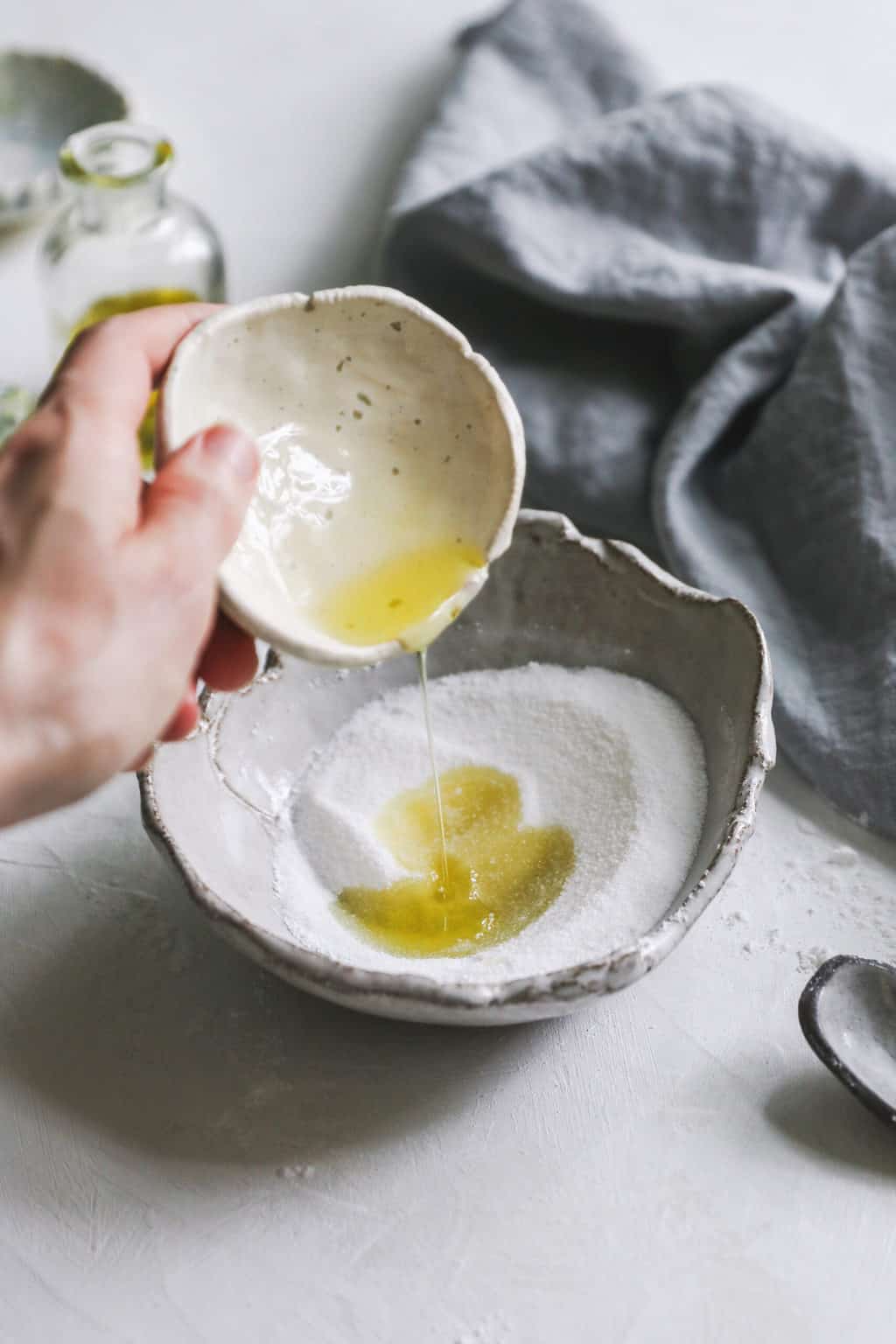
Step 3: Combine all ingredients
Add the oil mixture to the salts and stir until fully incorporated, breaking up any clumps.
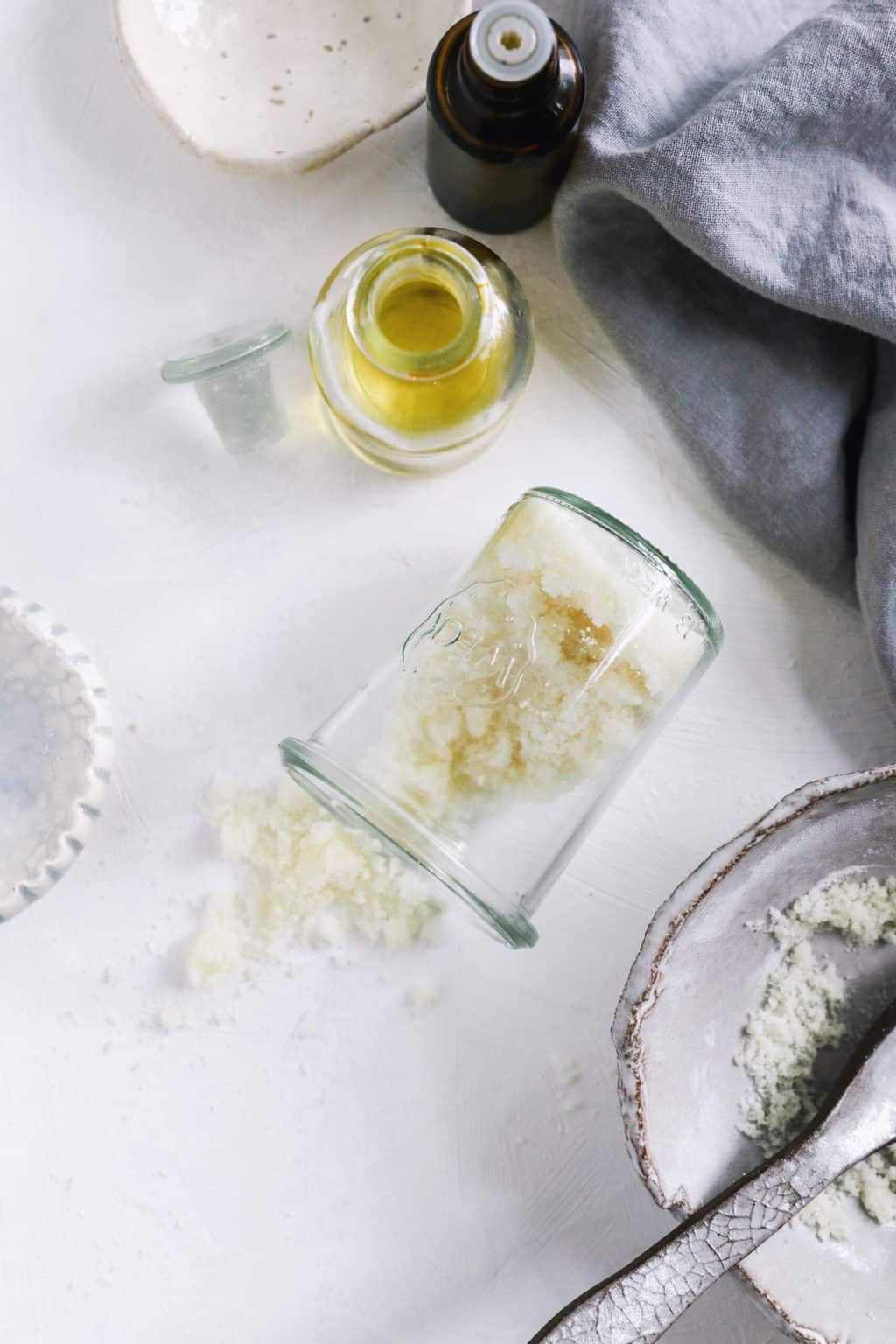
Step 4: Store in a lidded container
Store in a lidded container in a cool, dark place. Use about ½ to 1 cup per bath.
Ways To Customize DIY Bath Salts
By customizing your bath salts, you not only create a product that's uniquely yours but also turn a simple bath into a luxurious spa-like experience.
1. Change the Salt Base
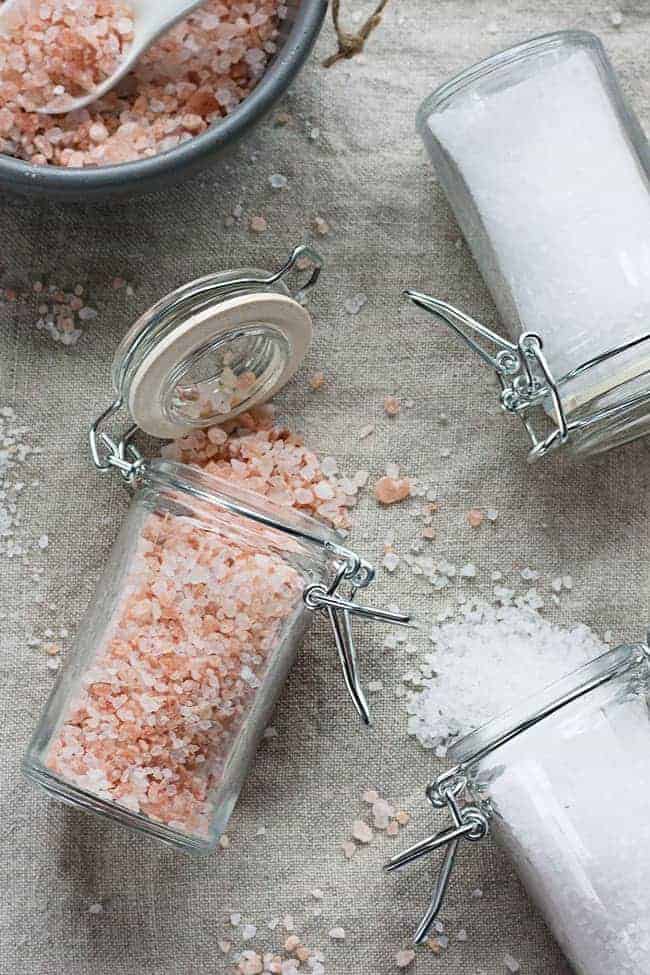
Instead of the usual Epsom and kosher salt mix, try using Himalayan pink salt for its rich mineral content, or Dead Sea salt, known for its therapeutic properties. Mix fine and coarse salts for a varied texture that looks appealing in a jar.
Sea Salt
Sea salt is a type of salt that is obtained by evaporating seawater. The mineral-rich salt contains a wide range of trace elements, and it softens skin, absorbs oil, and helps alkalize and cleanse the skin.
Any kind of sea salt will do, so go ahead and pick a fine-ground favorite or use whatever you have on hand.
Himalayan Pink Salt
This pretty pink salt is hand-mined from ancient sea salt deposits and is considered the purest form of natural salt. Himalayan salt contains 84 nourishing trace elements and minerals like calcium, iodine, iron, magnesium, potassium, sodium, and zinc.
A pink salt bath soak not only replenishes those minerals, it also eliminates toxins, balances the body’s pH, increases circulation, and brings relief to inflammation and irritations like eczema, psoriasis, or bug bites.
The salt pieces tend to be larger than with sea salt or kosher salt, and sitting on them can be a little uncomfortable in the bath. Pulse them a couple of times in the food processor or give them a few extra minutes to dissolve before getting into the tub. You can also choose an extra-fine grain Himalayan salt.
Dead Sea Salt
A soak with Dead Sea salt can help replenish 21 minerals, including magnesium, calcium, sulfur, bromide, iodine, sodium, zinc, and potassium. Those minerals help relax the body and muscles and cleanse and soften the skin.
The sulfur in Dead Sea salt is a natural disinfectant that can treat skin conditions like acne and eczema. Both sulfur and sodium are detoxifying agents that help the liver and cells get rid of waste.
2. Experiment with Essential Oils
Purpose-Driven Blends: Use tea tree and lavender for a skin-soothing mix, or cedarwood and sandalwood for a grounding, earthy vibe. A few of my favorite blends:
- Clear breathing: Combine eucalyptus and peppermint
- Romantic: Use a blend of rose absolute, cardamom, and vanilla
- Relax: Mix up clary sage, bergamot, lavender, and Roman chamomile
- Clear your mind: Nix anxious thoughts with lemon and rosemary
- Balancing: Invite calm with sage, mint, and tea tree
- Calming: Make a peaceful blend with Egyptian geranium, lavender, and rose absolute
- Sore muscles: Combine juniper berry, lavender, and ylang ylang
- Energizing: Try lemon, sweet orange, and rosemary
- Stress relief: Blend lemon, clove bud, cedarwood, and orange essence
3. Add Natural Additives
- Dried Flowers and Herbs: Incorporate dried rose petals, lavender buds, or eucalyptus leaves. Fresh herbs and flowers can be used but may not have as long of a shelf life and can mold or decay if not properly dried first. It’s usually better to use dried botanicals to extend the shelf life of your bath salts.
- Citrus Zest: Add grated lemon, lime, or orange zest for a fresh and invigorating scent.
4. Include Skin-Nourishing Oils
- Variety of Carrier Oils: Swap jojoba oil with argan oil for enhanced skin benefits, or try fractionated coconut oil for a lighter feel. These moisturizing bath salts use cocoa butter to add hydration.
- Infused Oils: Use carrier oils infused with herbs like calendula or rosehip for added skin-soothing properties.
5. Play with Colors
- Natural Colorants: Use beetroot powder for a pink hue, turmeric for yellow, or spirulina for green. Be cautious with the amount used to avoid staining the tub or your skin.
- Layers and Patterns: Create visually striking patterns by layering different colored salts in a clear jar.
6. Incorporate Exfoliants
- Fine Grains: Add finely ground oatmeal or almond meal for a gentle exfoliating property.
- Clay: Mix in a small amount of kaolin or bentonite clay for detoxifying properties and a creamy texture in the bath.
7. Enhance the Experience
- Muscle Soothing: Add a handful of powdered ginger or mustard to the salts to help soothe sore muscles.
- Aromatherapy Boosters: Include a few drops of vanilla extract or rosewater for additional aromatherapy benefits.
Bath Salt Benefits: 8 Essential Oil + Salt Blends
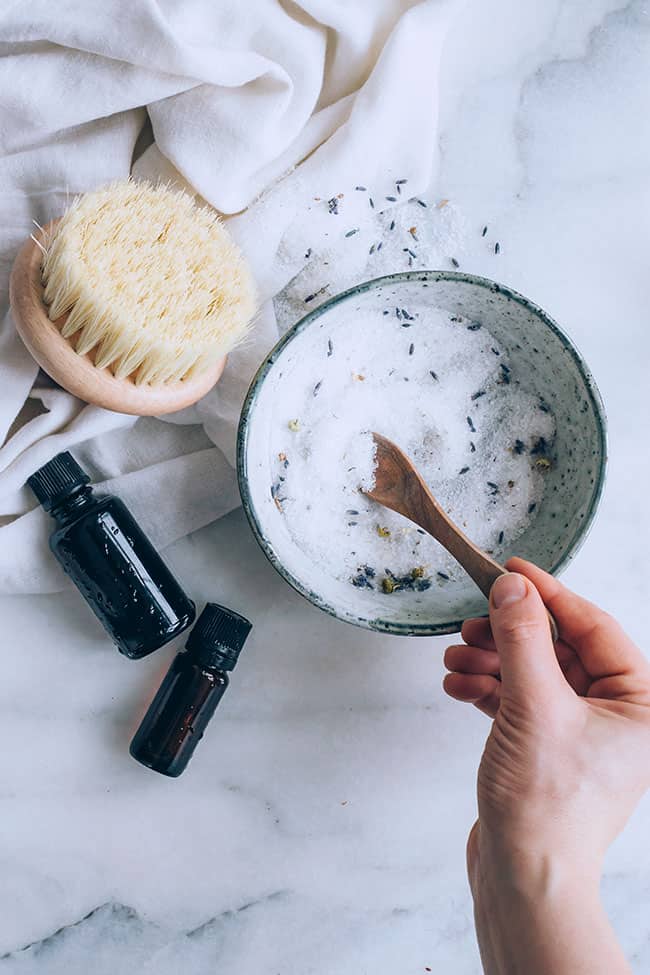
Aromatherapy bath salts can provide a variety of benefits, depending on the specific ingredients used. Here's a guide to picking the right salts and essential oils to promote relaxation, reduce stress and anxiety, soothe sore muscles, improve circulation, or nourish the skin.
1. Relaxation and Stress Relief
- Essential Oils: Lavender, chamomile, and bergamot are renowned for their calming and soothing properties. When inhaled during a warm bath, these scents can help reduce stress and promote a sense of peace.
- Bath Salts: The magnesium in Epsom salts can help relax muscles and relieve tension.
2. Improved Sleep
- Essential Oils: Lavender, vetiver, and sandalwood are often used to improve the quality of sleep. These oils help calm the mind and prepare the body for rest.
- Bath Salts: A warm bath with magnesium-rich salts like Epsom can help the body wind down and signal that it’s time to sleep.
3. Detoxification
- Essential Oils: Lemon, ginger, and rosemary have properties that support detoxification by promoting circulation and supporting the lymphatic system.
- Bath Salts: Sea salts and Himalayan pink salts are believed to draw out toxins and can help cleanse the skin’s pores.
4. Skin Health
- Essential Oils: Tea tree oil is antibacterial and antifungal, which makes it good for acne-prone skin. Geranium and frankincense can help tone and rejuvenate the skin.
- Bath Salts: Salt has exfoliating properties that can help to remove dead skin cells, improving skin texture and clarity.
5. Pain Relief
- Essential Oils: Eucalyptus and peppermint oils are effective for reducing pain, including headaches and muscle aches, due to their cooling effects and anti-inflammatory properties.
- Bath Salts: Epsom salts are particularly effective for easing muscle soreness and reducing inflammation, which is beneficial after exercise or for chronic pain conditions.
6. Enhanced Circulation
- Essential Oils: Oils like rosemary and ginger heat up the body and promote blood circulation, which can help reduce pain and inflammation.
- Bath Salts: The warm water of the bath itself helps to improve circulation, and adding salts can enhance this effect.
7. Mood Enhancement
- Essential Oils: Citrus oils like orange and lemon are uplifting and can help improve mood and provide a boost of energy.
- Bath Salts: The act of taking a warm, aromatic bath can itself be a mood lifter and provides a soothing experience.
8. Respiratory Support
- Essential Oils: Eucalyptus and peppermint oils are known for their ability to help clear the respiratory tract, which can be beneficial for those suffering from colds or respiratory ailments.
- Bath Salts: Breathing in steam infused with these essential oils can help open nasal passages and lungs.
Bath Salt Recipe Variations
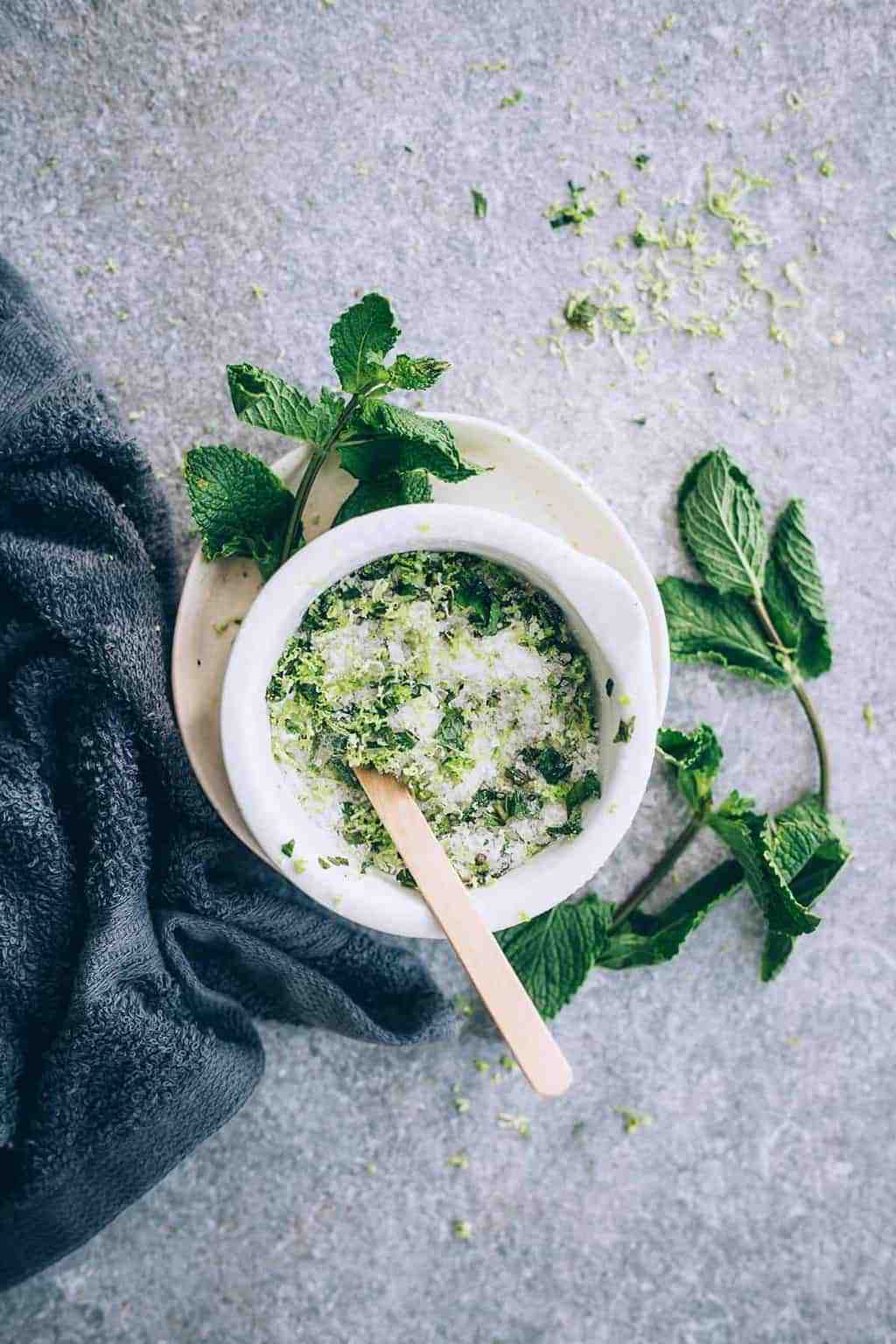
1. Minty Mojito Homemade Bath Salts
An easy mint mojito homemade bath salt recipe—the cooling, refreshing scents of mint and lime are perfect for summer soaking! Sometimes I use fresh mint leaves instead of mint essential oil, but the results are always the same—calming, uplifting, purifying.
- 2 cups Epsom salt sea salt or kosher salt
- Fresh mint finely diced
- Juice and zest of one lime
- 3-5 drops peppermint essential oil
Follow the same instructions as above.
2. Invigorating Morning Bath Salt Recipe
While it’s often easier to sneak away for a relaxing soak in the late evening after the kids are in bed, the morning shouldn’t be forgotten for its prime soaking opportunities. An invigorating morning bath will perk you up for the day ahead.
- 2 cups sea salt
- 2 tablespoons carrier oil, like grapeseed
- 10 drops orange essential oil
- 5 drops rosemary essential oil
Follow the same instructions as above.
3. Afternoon Pick-Me-Up Bath Salt Recipe
A post-lunch bath is perfect for healing and detoxification. Wait at least 2 hours after your last meal before settling in for a relaxing soak to help your body get rid of toxins and ease an over-burdened system.
- 1 cup Pink Himalayan salt
- 1 cup Epsom salt
- 2 tablespoons carrier oil, like grapeseed
- 15 drops grapefruit essential oil
Follow the same instructions as above.
4. Relaxing Evening Bath Salt Recipe
An evening bath will help you relax after a long day and get ready for a restful night’s sleep. Use Epsom salt to relax tense muscles and essential oils like lavender, chamomile or sandalwood to encourage sleep.
- 2 cups Epsom salt
- 2 tablespoons carrier oil, like grapeseed
- 10 drops lavender essential oil
- 10 drops chamomile essential oil
Follow the same instructions as above.
5. Big Batch Sea Salt Bath Salts with Jasmine + Orange
Make a jar of these big batch sea salt bath salts and have them on hand whenever you need a long soak. The orange-jasmine scent is amazing!
- 8 cups Dead Sea Salt
- 2 cups baking soda
- 60 drops orange essential oil
- ½ cup dried jasmine blossoms
Follow the same instructions as above.
Tips for Storing Bath Salts
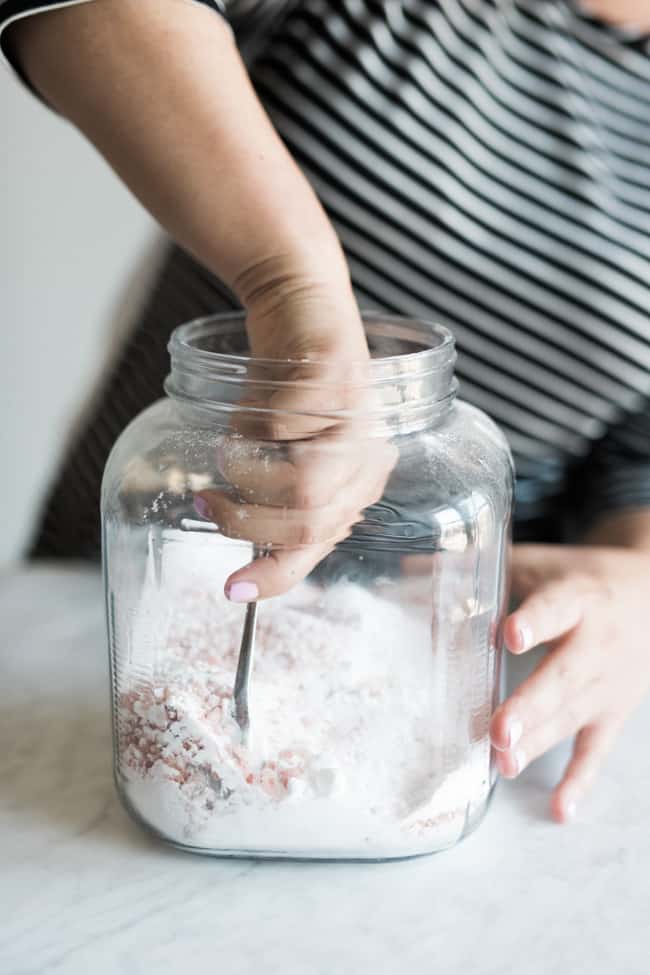
Big Batches: I'm a fan of making a big bath of bath salts at once so I can take multiple baths before having to make a new batch. Store your bath salts in a reusable jar and keep topping up your favorite mix.
Expiration: Properly stored in an airtight container and kept in a cool, dry place, homemade bath salts can last up to six months. However, I recommend using your salts within 1–2 months simply because they'll start to clump if left sitting for too long.
Clumping: It's the moisture in your bath salts that eventually makes them clumpy and unusable. To fix that, combine all the ingredients in a bowl, then spread evenly on a parchment-lined baking sheet.
Pop them in a 200°F oven, and bake for 15–20 minutes, stirring occasionally throughout. Let cool completely before transferring to a storage container.
Pressure Buildup: A few readers have mentioned that their bath salt jars exploded. What?!?
I've never had this happen, but my best guess is that something in the bath salts, whether it be the essential oils or mixing baking soda with the salt, can cause pressure to build inside airtight glass containers.
I use this jar to store my own DIY bath salts and have never noticed a build-up of pressure, probably because it doesn't create an airtight seal. You can also use Weck jars without the rubber gasket or a plastic Tupperware and you shouldn't run into any issues.
To be safe, pop the lid on your container every couple of days to release any pressure that may have built up.
Tips for Using Homemade Bath Salts
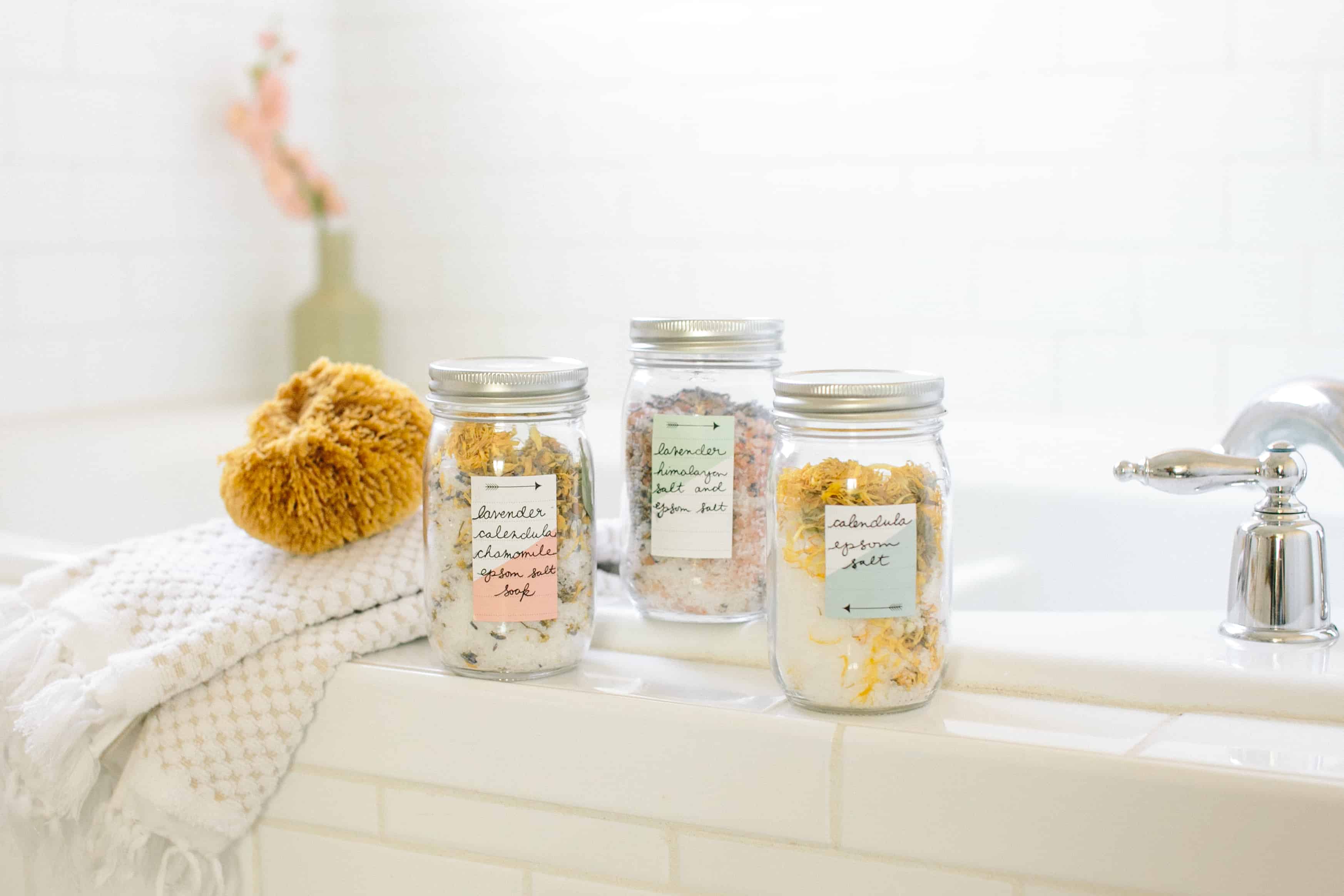
- Amount: Generally, you can use about ½ to 1 cup of bath salts for a standard-sized bathtub.
- Temperature: Warm, but not too hot, water is ideal for dissolving the salts and releasing the fragrant oils.
- When to Add: The time to add your bath salts is after the bath is full, and you're in it. If you add them while the water is running, then the aromatherapy scents will evaporate before you get into the tub.
- Duration: Soak for at least 20 minutes but not more than an hour to gain the full benefits of the essential oils and salts.
- Frequency: You can use wellness aromatherapy bath salts as often as you like, depending on your individual needs and preferences. Some people prefer to use them once a week, while others use them more frequently.
Which blend would you add to your next bath?
FAQ
While some brands of wellness aromatherapy bath salts may be safe for use in a Jacuzzi or hot tub, it is important to check with the manufacturer before using them. Some ingredients may be harmful to the equipment or to other bathers.
Some wellness aromatherapy bath salts may contain ingredients that can help to promote relaxation and improve sleep, such as lavender oil. However, it is important to talk to a healthcare provider if you are experiencing chronic insomnia or other sleep issues.
If you plan to use your bath salts right away (say, within the next couple of days), then go for it. Otherwise, you run the risk of the herbs going bad and ruining your bath salts before you have a chance to use them.
When you have them cut and ready for the bath, put them in a small mesh or net bag to keep them in place while they diffuse into the water, so they won’t scatter while you bathe.
Clumping often occurs due to moisture from the air or essential oils. To prevent clumping, ensure your bath salts are stored in an airtight container. You can also add a small amount of rice or a few silica gel packets to absorb any excess moisture.
To increase the moisturizing properties, you can add more carrier oil or include ingredients like powdered milk or honey powder, which can help soften and hydrate the skin.
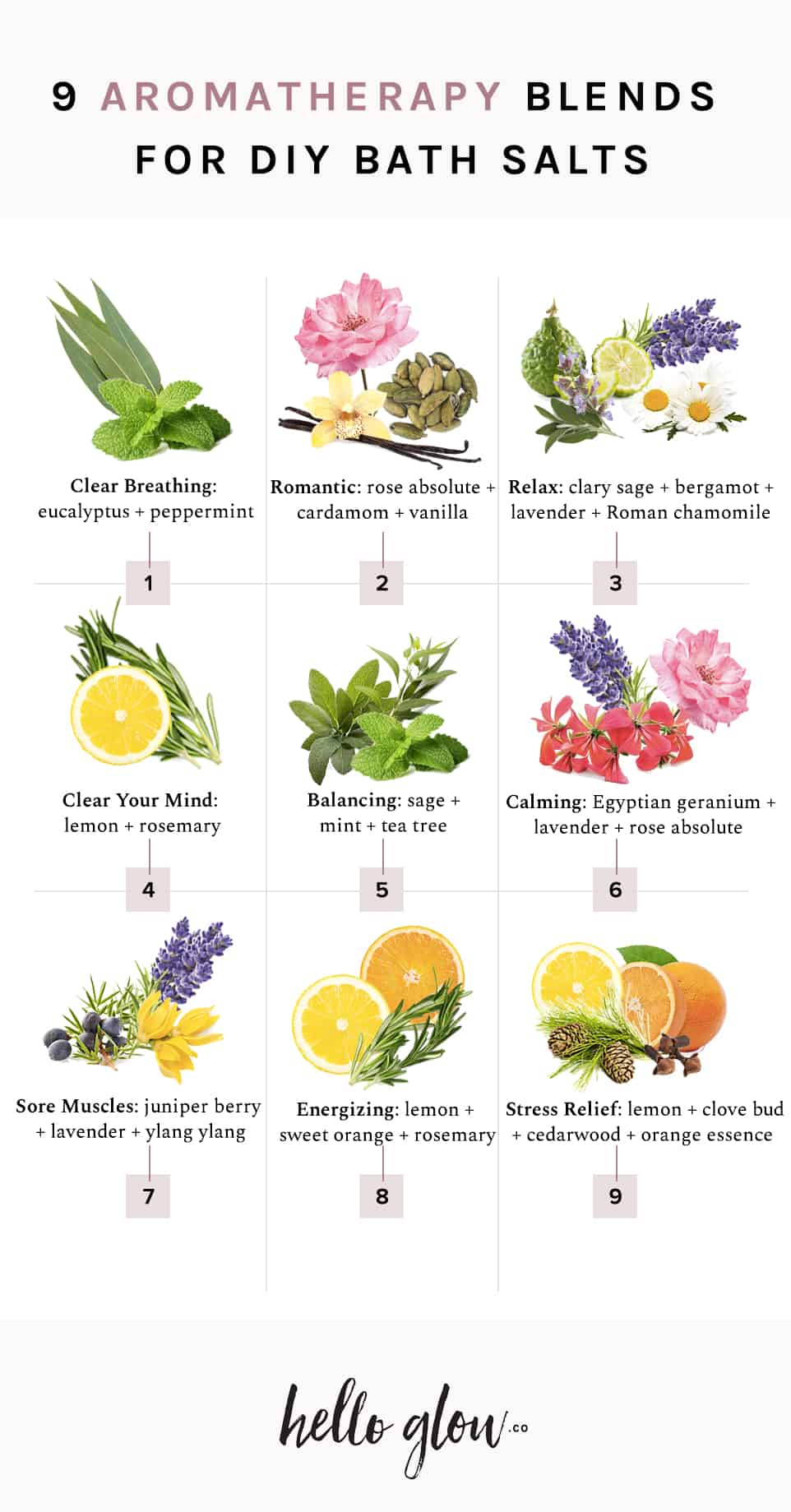
Scented Wellness Bath Salts
Equipment
- Mixing bowls
- Jar with lid
Materials
- 1 cup Epsom salt
- 1 cup kosher salt
- ½ cup baking soda
- 2 tablespoon carrier oil, like grapeseed
- 20 drops essential oil (see Notes for detailed blends)
Instructions
- Combine salts and baking soda in a small bowl.
- Separately, combine the essential oils and carrier oil.
- Add oil mixture to the salts and stir until fully incorporated, breaking up any clumps.
- Store in a lidded container in a cool, dark place. Use about ½–1 cup per bath.
Notes
- Clear Sinuses: 10 drops eucalyptus + 10 drops peppermint
- Relaxation: 10 drops lavender + 10 drops bergamot
- Clear your mind: 10 drops lemon + 10 drops rosemary
- Balancing: 10 drops sage + 5 drops mint + 5 drops tea tree
- Calming: 5 drops geranium + 10 drops lavender + 5 drops rose
- Uplifting: 5 drops orange + 5 drops clove + 5 drops cedarwood + 5 drops lemon
References
References
1. Gröber U, et al. Magnesium in prevention and therapy. Nutrients. 2015.
2. Philips CA, et al. Severe liver injury due to Epsom salt naturopathy. BMJ case Rep. 2017.
3. Milstone LM. Scaly skin and bath pH: rediscovering baking soda. J Am Acad Dermatol. 2010.
4. Hongratanaworakit T. Aroma-therapeutic effects of massage blended essential oils on humans. Nat Prod Commun. 2011.
This post was medically reviewed by Dr. Holly Smith, a board-certified physician in nephrology and internal medicine with a background in nutrition. Learn more about Hello Glow's medical reviewers here. As always, this is not personal medical advice, and we recommend that you talk with your doctor.
927
